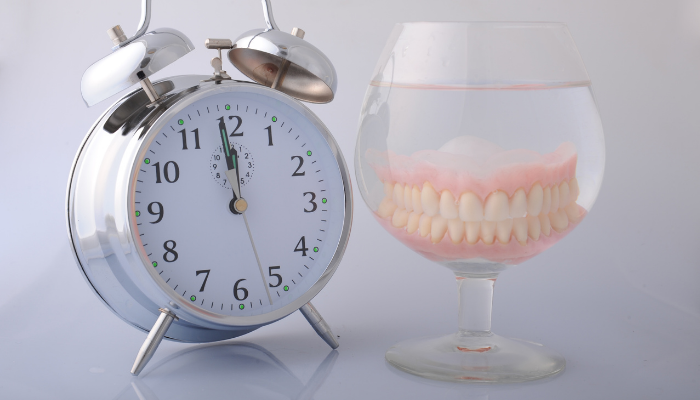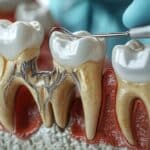Most patients experiencing tooth failure prefer dental implants as a superior solution to dentures. This is usually for a few reasons:
- Comfort – Dentures rest on the gumline without strong support, which can allow the denture to rub against the gums, causing pain or irritation. For extra support, many denture wearers use an adhesive that keeps the denture stuck to the palate. Denture adhesive is often reported to leave a “slimy” feeling in the mouth, and the coverage of the palate can feel intrusive. Dental implants, however, affix the prosthetic securely in the jaw, much like the root of a tooth. With dental implants, there is no coverage of the palate or rubbing against the gums.
- Confidence – Dentures can slip, causing slurred speech and embarrassing incidents for their wearers. Dental implants remain securely fixed in the mouth and often provide greater confidence to smile, eat and socialize with friends.
- Diet – Dentures only restore up to 25% of original bite force, which greatly restricts the variety of food a patient can eat. Dental implants restore up to 85% of original bite force and allow their recipients to bite and chew through most foods with fewer restrictions.
However, a dental implant procedure requires a greater financial investment than denture placement. Some choose to have dentures placed temporarily while they save money for dental implants. This raises the question, is this the best option?
Should I have dentures placed while I save for dental implants?
The short answer:
If financing options are at all possible for you, have dental implants placed as close as you can to the time teeth are extracted.
If a dental implant procedure is simply impossible for you at this time, dentures can be a temporary option, but there will likely be long-term negative effects. Full mouth dental implants will likely still be an option for you later on, but extra techniques may be required which increase fees and possibly time.
Why should I not wait to get dental implants?
- Bone Loss – When teeth go away, bone in the jaw goes away. This is known as “resorption”, or bone loss. If teeth are replaced with dental implants in a timely manner, the surrounding jawbone will maintain its integrity. If not, your jaw and gum line will begin to recede. Over time, this reduces your chances of having implants securely embedded in natural bone within your jaw. For some, bone loss becomes noticeable in as little as 2 weeks. For others, it may take more than a year.
- Health – The jawbone and gums act as a natural barrier between invasive bacteria and your bloodstream. As that barrier recedes, you become more exposed to harmful bacteria making their way into the rest of your body.
- Appearance – Severe bone loss is often present among those who wear dentures for many years. As the jawbone deteriorates, it creates a “sunken” look in the face.

I have bone loss from wearing dentures, now what?
If your bone loss isn’t severe, the surgeon will place implants in 4-6 locations in your jaw with sufficient bone remaining, and the entire prosthesis will be fixed to these implants.
Even if you have severe bone loss, an experienced oral surgeon can still provide you with dental implant placement using special techniques.
- Bone Grafting – Where bone is missing, surgeons can place materials that will integrate with remaining bone and heal to function as a foundation for implants to be placed. In the upper jaw, a sinus lift may be required preceding the bone grafting. Bone grafting requires a healing period before the implant can be placed, and then a healing period after the implant is placed. This process can add 3 months to 1 year to your implant treatment.
- Zygomatic Implants – Zygomatic implants are embedded in the zygoma (cheekbone), which is sufficiently thick and dense enough for implant placement when the jawbone is not. Since zygomatic implants can be placed in one day and have a higher success rate than bone grafting, they are the ideal solution for bone loss when receiving a full arch prosthesis in the upper jaw.
Although the placement of zygomatic implants is a very safe and effective procedure, it requires technical skills that many oral surgeons don’t possess. Few oral surgeons place zygomatic implants on a regular basis. Depending on your location, you may need to travel to have zygomatic implants placed.









